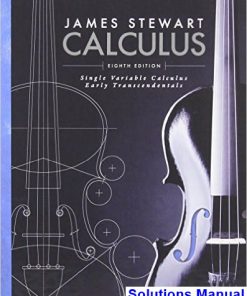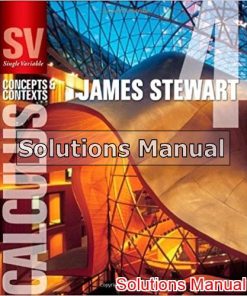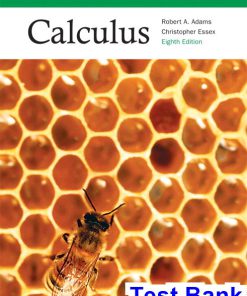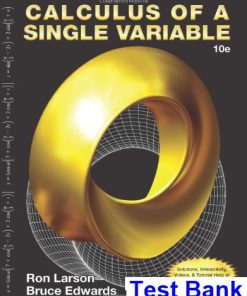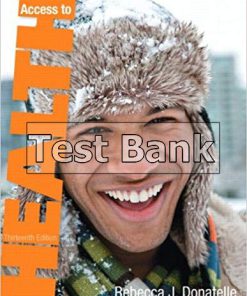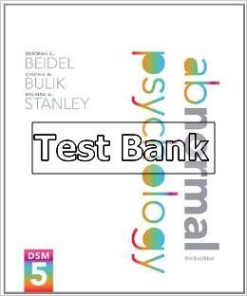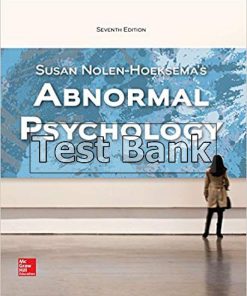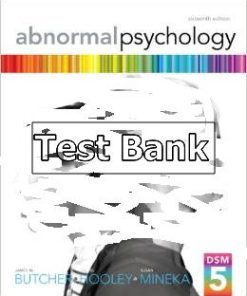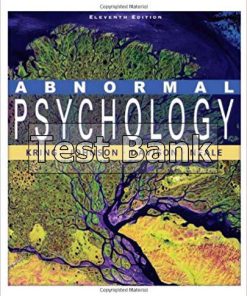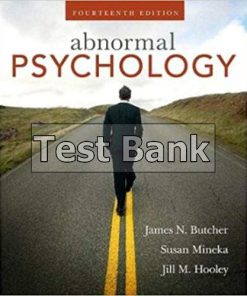Single Variable Calculus 7th Edition Stewart Test Bank
You may also like
This is completed downloadable of Single Variable Calculus 7th Edition Stewart Test Bank

Product Details:
- ISBN-10 : 0538497831
- ISBN-13 : 978-0538497831
- Author: James Stewart
Success in your calculus course starts here! James Stewart’s CALCULUS texts are world-wide best-sellers for a reason: they are clear, accurate, and filled with relevant, real-world examples. With SINGLE VARIABLE CALCULUS, Seventh Edition, Stewart conveys not only the utility of calculus to help you develop technical competence, but also gives you an appreciation for the intrinsic beauty of the subject. His patient examples and built-in learning aids will help you build your mathematical confidence and achieve your goals in the course.
Table of Content:
- Preface
- To the student
- Diagnostic tests
- A preview of calculus
- 1. Functions and models
- 1.1. Four ways to represent a function
- 1.2. Mathematical models : a catalog of essential functions
- 1.3. New functions from old functions
- 1.4. Graphing calculators and computers
- 1.5. Exponential functions
- 1.6. Inverse functions and logarithms
- Review
- Principles of problem solving
- 2. Limits and derivatives
- 2.1. The tangent and velocity problems
- 2.2. The limit of a function
- 2.3. Calculating limits using the limit laws
- 2.4. The precise definition of a limit
- 2.5. Continuity
- 2.6. Limits at infinity ; horizontal asymptotes
- 2.7. Derivatives and rates of change
- Writing project : early methods for finding tangents
- 2.8. The derivative as a function
- Review
- Problems plus
- 3. Differentiation rules
- 3.1. Derivatives of polynomials and exponential functions
- Applied project : building a better roller coaster
- 3.2. The product and quotient rules
- 3.3. Derivatives of trigonometric functions
- 3.4. The chain rule
- Applied project : where should a pilot start descent?
- 3.5. Implicit differentiation
- 3.6. Derivatives of logarithmic functions
- 3.7. Rates of change in the natural and social sciences
- 3.8. Exponential growth and decay
- 3.9. Related rates
- 3.10. Linear approximations and differentials
- Laboratory project : Taylor polynomials
- 3.11. Hyperbolic functions
- Review
- Problems plus
- 4. Applications of differentiation
- 4.1. Maximum and minimum values
- Applied project : the calculus of rainbows
- 4.2. The mean value theorem
- 4.3. How derivatives affect the shape of a graph
- 4.4. Indeterminate forms and L’Hospital’s rule
- Writing project : the origins of L’Hospital’s rule
- 4.5. Summary of curve sketching
- 4.6. Graphing with calculus and calculators
- 4.7. Optimization problems
- Applied project : the shape of a can
- Applied project : Planes and birds: Minimizing energy
- 4.8. Newton’s method
- 4.9. Antiderivatives
- Review
- Problems plus
- 5. Integrals
- 5.1. Areas and distances
- 5.2. The definite integral
- Discovery project : area functions
- 5.3. The fundamental theorem of calculus
- 5.4. Indefinite integrals and the net change theorem
- Writing project : Newton, Leibniz, and the invention of calculus
- 5.5. The substitution rule
- Review
- Problems plus
- 6. Application of integration
- 6.1. Areas between curves
- Applied project : the gini index
- 6.2. Volumes
- 6.3. Volumes by cylindrical shells
- 6.4. Work
- 6.5. Average value of a function
- Applied projects : calculus and baseball
- Applied projects : where to sit at the movies
- Review
- Problems plus
- 7. Techniques of integration
- 7.1. Integration by parts
- 7.2. Trigonometric integrals
- 7.3. Trigonometric substitution
- 7.4. Integration of rational functions by partial fractions
- 7.5. Strategy for integration
- 7.6. Integration using tables and computer algebra systems
- Discovery project : patterns in integrals
- 7.7. Approximate integration
- 7.8. Improper integrals
- Review
- Problems plus
- 8. Further applications of integration
- 8.1. Arc length
- Discovery project : arc length contest
- 8.2. Area of a surface of revolution
- Discovery project : rotating on a slant
- 8.3. Applications to physics and engineering
- Discovery project : complementary coffee cups
- 8.4. Applications to economics and biology
- 8.5. Probability
- Review
- Problems plus
- 9. Differential equations
- 9.1. Modeling with differential equations
- 9.2. Direction fields and Euler’s method
- 9.3. Separable equations
- Applied project : how fast does a tank drain?
- Applied project : which is faster, going up or coming down?
- 9.4. Models for population growth
- 9.5. Linear equations
- 9.6. Predator-prey systems
- Review
- Problems plus
- 10. Parametric equations and polar coordinates
- 10.1. Curves defined by parametric equations
- Laboratory project : running circles around circles
- 10.2. Calculus with parametric curves
- Laboratory project : Bézier curves
- 10.3. Polar coordinates
- Laboratory project : Families of polar curves 10.4. Areas and lengths in polar coordinates
- 10.5. Conic sections
- 10.6. Conic sections in polar coordinates
- Review
- Problems plus
- 11. Infinite sequences and series
- 11.1. Sequences
- Laboratory project : logistic sequences
- 11.2. Series
- 11.3. The integral test and estimates of sums
- 11.4. The comparison tests
- 11.5. Alternating series
- 11.6. Absolute convergence and the ratio and root tests
- 11.7. Strategy for testing series
- 11.8. Power series
- 11.9. Representations of functions as power series
- 11.10. Taylor and Maclaurin series
- Laboratory project : an elusive limit
- Writing project : how Newton discovered the binomial series
- 11.11. Applications of Taylor polynomials
- Applied project : radiation from the stars
- Review
- Problems plus
- 12. Vectors and geometry of space
- 12.1. Three-dimensional coordinate systems
- 12.2. Vectors
- 12.3. The dot product
- 12.4. The cross product
- Discovery project : the geometry of a tetrahedrom
- 12.5. Equations of lines and planes
- Laboratory project : putting 3D in perspective
- 12.6. Cylinders and quadric surfaces
- Review
- Problems plus
- 13. Vector functions
- 13.1. Vector functions and space curves
- 13.2. Derivatives and integrals of vector functions
- 13.3. Arc length and curvature
- 13.4. Motion in space : velocity and acceleration
- Applied project : Kepler’s laws
- Review
- Problems plus
- 14. Partial derivatives
- 14.1. Functions of several variables
- 14.2. Limits and continuity
- 14.3. Partial derivatives
- 14.4. Tangent planes and linear approximations
- Applied project ; the speedo LZR racer
- 14.5. The chain rule
- 14.6. Directional derivatives and the gradient vector
- 14.7. Maximum and minimum values
- Applied project : designing a dumpster
- Discovery project : quadratic approximation and critical points
- 14.8. Lagrange multipliers
- Applied project : rocket science
- Applied project : hydro-turbine optimization
- Review
- Problems plus
- 15. Multiple integrals
- 15.1. Double integrals over rectangles
- 15.2. Double integrals over general regions
- 15.3. Double integrals in polar coordinates
- 15.4. Applications of double integrals
- 15.5. Surface area
- 15.6. Triple integrals
- Discovery project : volumes of hyperspheres
- 15.7. Triple integrals in cylindrical coordinates
- Discovery project : the intersection of three cylinders
- 15.8. Triple integrals in spherical coordinates
- Applied project : roller derby
- 15.9. Change of variables in multiple integrals
- Review
- Problems plus
- 16. Vector calculus
- 16.1. Vector fields
- 16.2. Line integrals
- 16.3. The fundamental theorem for line integrals
- 16.4. Green’s theorem
- 16.5. Curl and divergence
- 16.6. Parametric surfaces and their areas
- 16.7. Surface integrals
- 16.8. Stokes’ theorem
- Writing project : three men and two theorems
- 16.9. The divergence theorem
- 16.10. Summary
- Review
- Problems plus
- 17. Second-order differential equations
- 17.1. Second-order linear equations
- 17.2. Nonhomogeneous linear equations
- 17.3. Applications of second-order differential equations
- 17.4. Series solutions
- Review
- Appendixes
- A. Numbers, inequalities, and absolute values
- B. Coordinate geometry and lines
- C. Graphs of second-degree equations
- D. Trigonometry
- E. Sigma notation
- F. Proofs of theorems
- G. The logarithm defined as an integral
- H. Complex numbers
- I. Answers to odd-numbered exercises
- Index.
People Also Search:
single variable calculus stewart
single variable calculus 7th edition stewart
single variable calculus
single variable calculus 7th edition
single variable calculus 7th edition download scribd
single variable calculus 7th edition testbank download pdf

